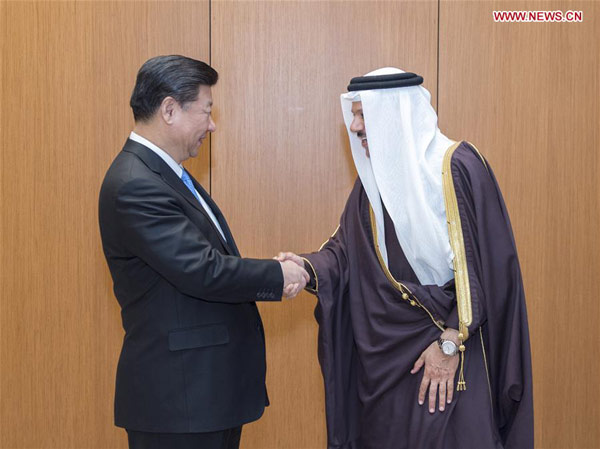 |
|
Chinese President Xi Jinping (L) meets with Gulf Cooperation Council (GCC) Secretary-General Abdul Latif Bin Rashid Al Zayani in Riyadh, Saudi Arabia, Jan 19, 2016. Xi arrived on Tuesday for a state visit to Saudi Arabia, the first stop of his three-nation tour of the Middle East. [Photo/Xinhua] |
President Xi Jinping is on a three-nation tour of the Middle East, during which he is visiting Saudi Arabia, Egypt and Iran. Before Xi's first foreign trip of this year, Foreign Minister Wang Yi met with Khaled Khoja, president of Syria's main opposition National Coalition, earlier this month and urged him to participate in negotiations to end the Syrian conflict, and Vice-Foreign Minister Zhang Ming visited the three Middle East countries.
The Middle East is vital for Beijing not only as a major oil supplier and a potential investment and trade market, but also as a key to the success of its Belt and Road Initiative.
China's mediation to resolve the Libyan crisis, the Iranian nuclear issue and the longstanding Israel-Palestine conflict has played a very important role in defusing tensions in the Middle East.
Syrian Foreign Minister Walid Muallem said his government would hold talks with the opposition parties when he was visiting Beijing last month. This was the first time that Damascus responded to the UN Security Council Resolution 2254 on Syria. China's mediatory efforts have been welcomed not only by the Syrian government but also Syrian opposition leaders such as Khaled Khoja, who said his party supported the resolution and is committed to finding a political solution to the crisis during his visit to Beijing earlier this month.
The historic breakthroughs in the Iranian nuclear deal, too, have a lot to do with China's efforts, which have been praised by the United States and Iran both.
For years, Beijing had been advocating peaceful settlement of the Iranian nuclear issue, insisting that negotiations and perhaps moderate sanctions be used to draw Teheran to the talks table, without violating its legitimate interests under the current non-proliferation regime. Apart from its mediatory role, China also helped break the technological barriers in the final-stage negotiations, which involved a slew of sensitive agendas and discreet stances.
Beijing has been paying closer attention to Middle East affairs since the end of the Cold War. When tensions between Palestine and Israel escalated in 2002 and the entire Middle East was on tenterhooks, China sent a special envoy to the Middle East to mediate among regional players. In 2011, China for the first time supported the UN's economic sanctions on a member state (Libya) and advocated dialogue between the Libyan government and opposition parties to resolve the political crisis in the country.
China's efforts to help the Middle East countries maintain peace and stability in the region are in line with its comprehensive diplomatic strategy as a rising major power. The fact that China maintains friendly relations with most of the regional powers, whose economies incidentally are complementary to the Chinese economy, gives it a unique edge in bilateral relationships.
Besides, China has never interfered in other countries' domestic affairs. Instead, thanks to its robust growth in recent years, it has consumed a considerable amount of petroleum products from Middle East countries and, in return, offered them investments and infrastructure projects without any political conditions attached.
Since the US now refrains from getting involved in Middle East affairs for certain strategic reasons, many regional leaders, such as Turkish President Recep Tayyip Erdogan, have welcomed China to play a more constructive role in the region. For that, of course, China has to enhance its national strength, learn more about how to deal with potential conflicts between different cultures and ethnicities, and further bolster bilateral economic links.
The author is president of blshe.com and a professor at Beijing Foreign Studies University.

I’ve lived in China for quite a considerable time including my graduate school years, travelled and worked in a few cities and still choose my destination taking into consideration the density of smog or PM2.5 particulate matter in the region.